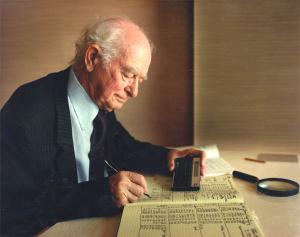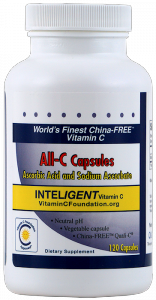Landmark Study Resolves the Linus Pauling and Arthur Robinson Vitamin C and Cancer Controversy, Both Men were Right
Study: High Doses of Vitamin C and B3 (and Not Low Dosages) Kill Tumor Cells of the Intestines
Published in the journal Cell Biology International, http://onlinelibrary.wiley.com/doi/10.1002/cbin.10830/full, the test tube study investigated both low and high doses of vitamin C and niacin on stem cell tumors of the intestine. Different dosages produced opposite effects. Dr. S. Sen, et. al., found that when taking a dosage that creates concentrations of vitamin C (and vitamin B3) from 5-25 micromoles/liter, a low concentration, there is a process of active reproduction of stem cell tumors of the intestine. At higher dosages (100 to 1,000 micromoles), these stem cells are destroyed.
The study published in a peer reviewed journal is the latest in a series of surprising year 2017 research reports supporting Linus Pauling's long-held assertion that vitamin C can be used to prevent, control, and even treat cancer.
This study is on top of several recent studies showing the unexpected value of high-dose vitamin C in controlling cancer stem cells, the slower growing cancer cells that spawn ordinary cancer cells. These CSCs are generally immune from standard chemotherapy and radiation because they multiply too slowly. Their survival results in rapid relapse of more aggressive cancer tumors.
Last June, Professor Michael Lisanti from the University of Salford, UK, published two studies that found vitamin C and antibiotics could be up to 100 times more effective at killing cancer cells than standard-of-care drugs. According to Lisanti, giving the antibiotic doxycycline followed by vitamin C effectively starves cancer cells of their fuel, resulting in their death in the lab, the researchers said.
Then last August, other research groups located in the UK and USA published their findings that injections of vitamin C could help fight blood cancers. Luisa Cimmino and Benjamin Neel at the New York University School of Medicine and their colleagues have discovered that, by injecting vitamin C, cancer growth could be prevented. Researchers halted the progression of leukemia in mice by promoting the function of a specific gene through high doses of vitamin C.
In the same month, researchers at Childrens Medical Center Research Institute at UT Southwestern discovered that stem cells absorb “unusually high” levels of vitamin C, which reportedly regulate function and suppress the development of leukemia. Dr. Michalis Agathocleous, lead author of the study, said stem cells use vitamin C to regulate chemical modifications on DNA, which turn genes on and off. “When stem cells don’t receive enough vitamin C, these [DNA-regulating mechanisms] can become damaged in a way that increases stem cell function but also increases the risk of leukemia.” Thus, if humans take up more vitamin C than normal, this vitamin will regulate and stabilize stem cell function and suppress the chances of developing leukemia.
Physician Daniel Couturier commented, “Available studies indicate that vitamin C at doses of 4 g/kg b.w. a pancreatic tumor mass reduction of more than 40% could be achieved in a xenograft animal model."
Linus Pauling and Arthur Robinson Cancer Controversy
While Pauling was promoting the use of vitamin C for controlling cancer, experiments at his institute had shown a disturbing effect. Indeed, when data from the experiments of his colleague Arthur Robinson suggested that vitamin C at the doses advocated by Pauling might actually increase the rate of tumor growth in an experimental model in mice, Robinson, a former student and long-time associate of Pauling, helped found the institute and became its first president. According to an investigative report by James Lowell, PhD, in the Nutrition Forum newsletter, Robinson’s own research led him to conclude in 1978 that the doses of vitamin C then being recommended by Pauling might actually promote some types of cancer in mice. Shortly after reporting this to Pauling, Robinson was asked to resign from the institute, his experimental animals were killed, his scientific data were impounded, and some of the previous research results were destroyed.
The latest research reveals that both men were right. While low doses promote cancers, high doses can kill cancers.
The documentary Cancer Can Be Killed, https://www.amazon.com/dp/B0748NNDK8 , a Jeff Witzeman film, introduces another theory that may explain how vitamin C works to kill cancer. Cancer requires fuel for its rapid cell division, and both its primary fuel, glucose, and vitamin C enter cells via insulin transport. If cancer patients lower their glucose intake and raise their vitamin C intake, the large amount of Vitamin C entering cancer cells becomes a “Trojan Horse.” The cancer tumors are not able to use the massive dosage of vitamin C they taken in for energy. This wonderful documentary is available for free to Amazon Prime members, and is only $1.99 otherwise.
The Vitamin C Foundation predicts, on the basis of this landmark study, that all cancer patients will be advised to supplement vitamin C in oral amounts that can achieve at least a 100 micromoles/liter concentration in their blood for as long as possible. The major problem is that the kidney constantly reduces vitamin C concentrations to less than this amount steady state, e.g. 85 micromoles/liter, with a half-life of 30 minutes. Our initial estimates are that 1 gram or less of oral vitamin C creates the concentrations that promote CSC proliferation, and that 4 grams creates the minimum required 100 micromole/litter concentration, at least for a little while. Dosages up to 80 grams would be appropriate and safe. Links to our analysis and final report on oral dosing will soon be available at our web site http://VitaminCFoundation.org
The Vitamin C Foundation nonprofit sponsors the world's finest China-FREE vitamin C products, such as Inteligent*Vitamin*C Inc.'s CONQUER (Liposomal Vitamin C and Maitake D Fraction), UltraFINE ascorbic acid powder, ALL-C capsules, Cameron's sugarless chewables and Cathcart's sodium ascorbate powder. Order online at IVC-STORE.COM. Wholesale pricing for physicians.
Robert Fonorow
The Vitamin C Foundation
6303100269
email us here
Legal Disclaimer:
EIN Presswire provides this news content "as is" without warranty of any kind. We do not accept any responsibility or liability for the accuracy, content, images, videos, licenses, completeness, legality, or reliability of the information contained in this article. If you have any complaints or copyright issues related to this article, kindly contact the author above.



